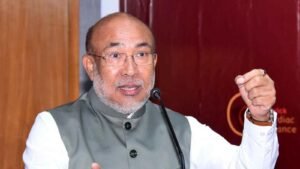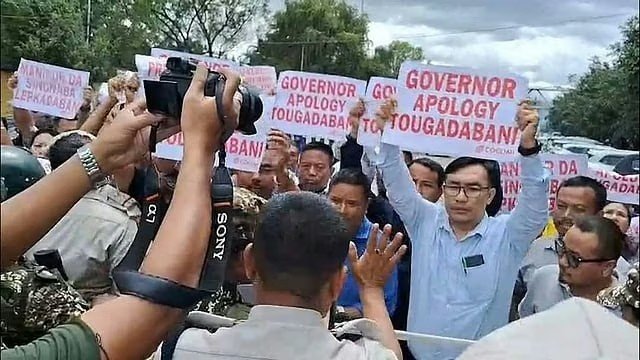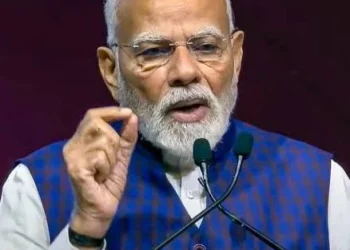Despite a government inquiry and promises of clarity, the findings remain undisclosed. As the protest enters its second week, journalists are demanding what should be obvious in a democracy: the truth.
BY PC Bureau
It has been several weeks since the Gwaltabi incident left a deep scar on the conscience of Manipur’s journalistic community. What should have been a routine coverage of the Shirui Lily Festival turned into a major controversy on May 20 when a group of accredited journalists—officially invited by the state—chose to return to Imphal after Army personnel at Gwaltabi, near Kangpokpi, removed the “Manipur” insignia from the Department of Information and Public Relations (DIPR) vehicle in which they were travelling.
What began as a straightforward demand for accountability has now grown into a prolonged, principled protest led by the All Manipur Working Journalists’ Union (AMWJU) and the Editors’ Guild Manipur (EGM). Yet the state’s silence is deafening. Most notably, Governor Ajay Kumar Bhalla—who received the official inquiry report three weeks ago—has yet to utter a word.
According to official sources, the committee comprising Additional Chief Secretary (Home) T. Ranjit Singh, Commissioner of IPR Bobby Waikhom, and Brigadier R.S. Rawat of the Red Shield Division submitted its report to the Governor nearly a month ago. Despite the passage of time, the report’s findings have neither been made public nor shared with the press bodies demanding transparency and redress.
If, as suspected, the Army removed the “Manipur” insignia from the media vehicle for security reasons—to avoid misidentification or as a preventive measure in a volatile area—then that needs to be clearly stated. Such an explanation, while debatable, at least acknowledges the concern. Without it, the act appears as arbitrary, unjustified, and humiliating—an unacceptable infringement on press dignity.
The government cannot expect silence to serve as damage control. In today’s deeply polarised environment, silence is no longer seen as restraint—it is viewed as complicity.
More troubling is that Chief Secretary Vineet Joshi, in a press conference following the journalists’ protests, assured the media that their concerns had been taken seriously and that the government would act transparently based on the inquiry findings. A similar assurance was also extended earlier to COCOMI (Coordinating Committee on Manipur Integrity), a powerful Meitei civil society body, in the context of security and civil-military coordination. In both cases, however, these assurances remain unfulfilled.
R EAD: Biren Singh Wants Government Back—But Is Manipur Ready?
EAD: Biren Singh Wants Government Back—But Is Manipur Ready?
If the inquiry found that the Army acted within reason, that conclusion must be made public. If, on the other hand, there were lapses—whether in communication, judgment, or protocol—the Governor must clarify what action is being taken. The role of the Governor is not to sit on reports—it is to act on them.
The longer the Raj Bhavan withholds the findings, the more credible the criticism that this inquiry was just another “buy time” exercise meant to defuse outrage rather than deliver answers.
In a state like Manipur—already torn by conflict and institutional erosion—truth and transparency are the only currency that can rebuild public trust. Governor Bhalla must release the findings—if not for the journalists who continue to wear black badges in protest, then for the integrity of the office he occupies.
The protest continues.
The All Manipur Working Journalists’ Union (AMWJU) and the Editors’ Guild Manipur (EGM) have entered the second week of their joint protest, demanding justice for the journalists. The protest—marked by the wearing of black badges and the weekly publication of protest slogans—remains non-violent yet firm.
“This shocking turn of events shows how journalists were denied their right to perform their duty,” a joint statement from AMWJU and EGM read. “The deliberate obstruction prevented media personnel from effectively carrying out their responsibilities as state-sponsored invitees.”
READ: Tragedy at Rath Yatra: Stampede Kills Three in Puri
Following the incident, the unions submitted a memorandum to the Governor demanding an impartial inquiry and accountability for the personnel involved. Yet, no satisfactory response has been forthcoming, prompting the protest’s extension.
This week’s protest slogans include:
- “Journalists deserve justice, not silence.”
- In Manipuri: “Journalist-singna achumba wayel phangpham thok-i; numitna leishilhoi-dabani.”
(Translation: “Journalists must perform their duty without fear; the day must not end in silence.”)
The unions have asked members to continue wearing black badges or ribbons while on duty and urged editors across Manipur to prominently carry these slogans in their bulletins.
In reaffirming their commitment to press freedom, AMWJU and EGM have made it clear: this protest is not merely about one incident—it is about preserving the space for journalists to work without intimidation, censorship, or erasure.














